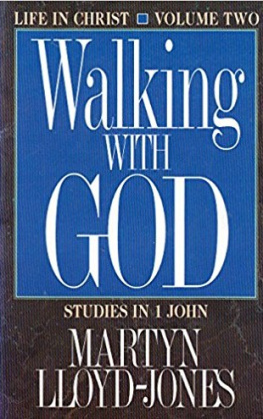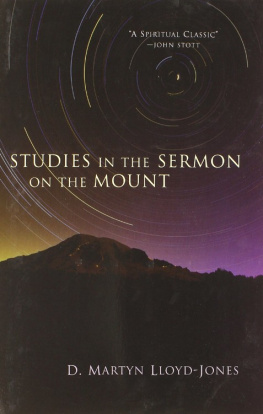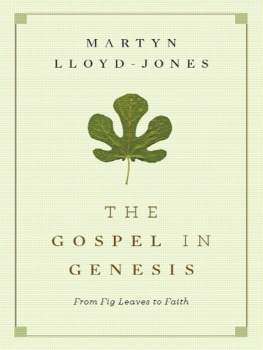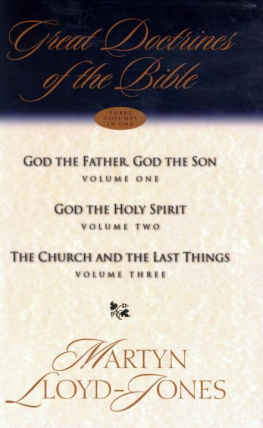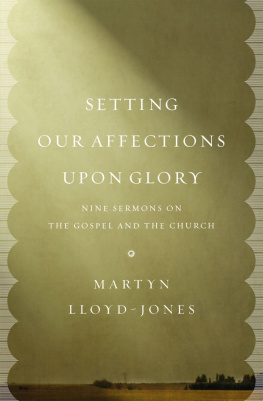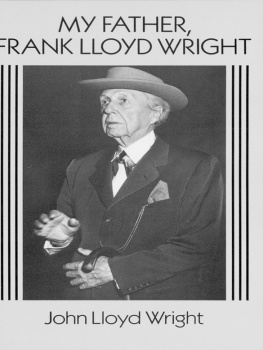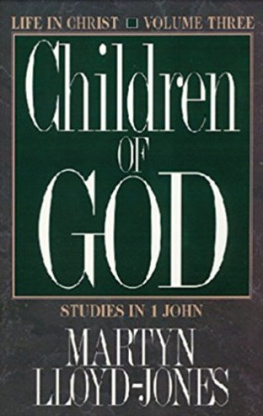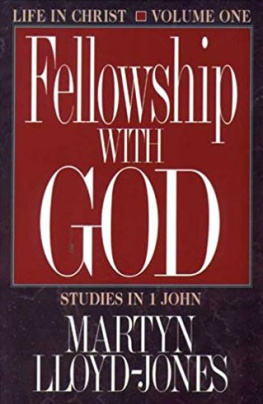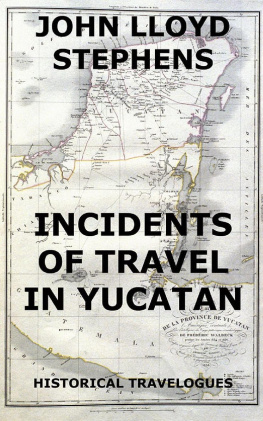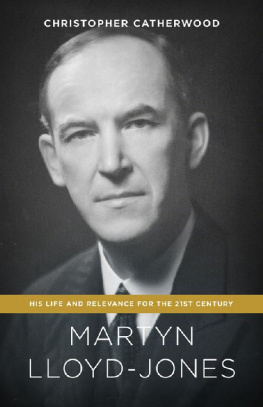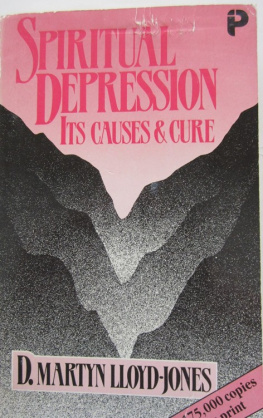Martyn Lloyd-Jones - Fellowship With God - 1st in the Studies in 1 John
Here you can read online Martyn Lloyd-Jones - Fellowship With God - 1st in the Studies in 1 John full text of the book (entire story) in english for free. Download pdf and epub, get meaning, cover and reviews about this ebook. year: 1993, publisher: Crossway Books, genre: Religion. Description of the work, (preface) as well as reviews are available. Best literature library LitArk.com created for fans of good reading and offers a wide selection of genres:
Romance novel
Science fiction
Adventure
Detective
Science
History
Home and family
Prose
Art
Politics
Computer
Non-fiction
Religion
Business
Children
Humor
Choose a favorite category and find really read worthwhile books. Enjoy immersion in the world of imagination, feel the emotions of the characters or learn something new for yourself, make an fascinating discovery.
- Book:Fellowship With God - 1st in the Studies in 1 John
- Author:
- Publisher:Crossway Books
- Genre:
- Year:1993
- Rating:5 / 5
- Favourites:Add to favourites
- Your mark:
- 100
- 1
- 2
- 3
- 4
- 5
Fellowship With God - 1st in the Studies in 1 John: summary, description and annotation
We offer to read an annotation, description, summary or preface (depends on what the author of the book "Fellowship With God - 1st in the Studies in 1 John" wrote himself). If you haven't found the necessary information about the book — write in the comments, we will try to find it.
Fellowship With God - 1st in the Studies in 1 John — read online for free the complete book (whole text) full work
Below is the text of the book, divided by pages. System saving the place of the last page read, allows you to conveniently read the book "Fellowship With God - 1st in the Studies in 1 John" online for free, without having to search again every time where you left off. Put a bookmark, and you can go to the page where you finished reading at any time.
Font size:
Interval:
Bookmark:
Who is a liar but he that denieth that Jesus is the Christ? He is antichrist, that denieth the Father and the Son. Whosoever denieth the Son, the same hath not the Father: but he that acknowledgeth the Son hath the Father also.And this is the promise that he hath promised us, even eternal life.And now little children, abide in him; that, when he shall appear, we may have confidence, and not be ashamed before him at his coming.
1 John 2:2223, 25, 28
I take those four verses together because they are the four verses with which we have not already dealt in our consideration of this section which runs from verses 1828. We have seen that the themes of this section are: the character of the enemy who is opposed to us; the understanding that is given us with respect to him; and then the way in which to fight him, or the arguments which we use in order to stimulate ourselves for the fight in order that we may defeat him. It is that third matter which we are concerned with now in these verses. They, again, are full of interest; indeed, it would be good if we could take the time to deal in detail with each verse separately. Take verse 22: Who is a liar but he that denieth that Jesus is the Christ. The language which is used there by the Apostle is very strong; he does not hesitate to refer to these antichrists as liars.
Now that is not only strong language, but it is also, in a sense, somewhat surprising. It comes as a real shock to some people, especially as John has just been previously appealing to us to love the brethren. How do you reconcile these two things? some say. Here is the man who appears as the great Apostle of love and who talks so much about love in this particular epistleso how is it that he should thus describe these people who had gone out, and those who had seduced them, as liars? This comes as something very strange to many people, especially at the present time, for the great word today is the word tolerance. We claim that we are the most tolerant generation that the world has ever known. We do not like strong language and controversy; we rather pride ourselves on having advanced beyond all that in every realm and department. The great thing today is to be getting together and understanding one anothers point of view; we should not denounce a point of view as John does here.
There are many instances of this. You have doubtless listened to discussions between Christians and unbelievers on the radio and heard how they often congratulate themselves on being such nice men! They spend so much time in trying to understand one anthers point of view. One Christian said recently that we must not hold these views too fiercely and strongly. So certainly we must not call a man who is an unbeliever, and who denies Jesus as the Christ, a liar!
That is, as you will agree, the characteristic of the present mentality and outlook. It is a time for getting together, we are told, and, in view of the common enemy and the unbelief that is facing the Church, we must not be over-punctilious; and if people want to call themselves Christian, then let us welcome it and be glad that they do so, though they may say that Jesus is only a man and not the Son of God. If they are in any way interested in Him and anxious to practise His ethics, let us all get together, even perhaps with those who are just theists and merely believe in the being of God.
That is the modem attitude, and it makes a word like this sound very harsh to our ears. But what we have here is in many ways very characteristic of the New Testament. John is not the exception; John did not use language like this because he was Boanerges, one of the sons of thunder (Mark 3:17)you find others doing the same thing. Listen to the Apostle Paul using language like that to the Galatians: Though we, or an angel from heaven, preach any other gospel unto you than that which we have preached unto you, let him be accursed (Gal 1:8). You cannot imagine anything stronger than that. Or listen to him as he writes to the Corinthians: If any man love not the Lord Jesus Christ, let him be Anathema (1 Cor 16:22). Again it is very strong language.
Remember, too, the preaching of John the Baptist when he looked at his congregation, which consisted of Pharisees and others, and said, O generation of vipers, who hath warned you to flee from the wrath to come? (Luke 3:7). Think also of the words of our blessed Lord Himself as He addressed the Pharisees, towards the end of His life; He referred to them as whited sepulchres (Matt 23:27). Now I emphasise all this merely because surely we must be rather careful lest we put ourselves into a position in which we claim that we are more Christian than the Lord Jesus Christ Himself and His blessed Apostles. There is a danger that we may confuse sentimentality and a doctrinal laxity and looseness for a true spirit of charity. The New Testament uses the language of which I have just been reminding you, and here it is in its essenceliars.
So then, how do we reconcile these things? Well, there is a very real distinction drawn in the New Testament between what we are to endure for ourselves and our response when the truth is attacked. The Sermon on the Mount tells us to turn the other cheek; quite right, there is no inconsistency between what John says here with that teaching. With regard to ourselves and our own personal feelings we are to endure anything and everything; we are not to stand up for ourselves; we are not to call people liars who attack us in person. But where the truth is concerned, where doctrine is involved, where the whole essence of the gospel comes in, and especially the person of the Lord Jesus Christ, we are to stand and be strong and we are not to hesitate to use language like this.
As regards ourselves, tolerance and charity; let the world despise us and malign and persecute us and say what it will concerning uswe are to go steadily forward, expecting such things to happen. But when it becomes a question of truth which is absolutely vital to salvation and to the glory of God, there must be no compromise and there must be no attempt just to accommodate ourselves to the other persons point of view. We are rather to take the position of John and to say, Who is a liar but he that denieth that Jesus is the Christ.
Now this is a very dangerous statement to make. It is very easy to persuade ourselves that we are just manifesting righteous indignation and being angry and sinning not when really we are just contending for some particular ***shibboleth of our own. We are only to stand like this about great, vital, central matters of doctrine. There are matters about which Christian people have never agreed. We must not, for example, use this kind of language for odd points of prophecy or if a man does not take our particular prophetic view; the New Testament does not make this stand on matters like that. No, but on central doctrine, this is where we have to walk carefully and circumspectly. So we are not only to draw the distinction between ourselves and the truth, but also between truth which is central and of which we must be certain, and matters about which there may be what we can describe as a legitimate difference of opinion. So the point here is that John does regard this particular matter dearly as of central and vital importance. That is why he not only uses this language but makes such a strong appeal.
Let us, then, consider it like this: Why is John so concerned about this matter? Why does he call these antichrists liars? Why does he say that these people who are teaching that the eternal Son of God came upon the man Jesus at the baptism and left Him on the Crosswhy does he say that such people are liarswhy does he denounce them so vehemently? There are a number of answers to that question. The first is that what the antichrists are saying is a lie, and he goes on to elaborate: Who is a liar but he that denieth that Jesus is the Christ? He is antichrist, that denieth the Father and the Son. John has already said, I have not written unto you because ye know not the truth, but because ye know it, and that no lie is of the truth (v 21). And that is his first reasonthat what these people were teaching does not correspond to the facts.
Font size:
Interval:
Bookmark:
Similar books «Fellowship With God - 1st in the Studies in 1 John»
Look at similar books to Fellowship With God - 1st in the Studies in 1 John. We have selected literature similar in name and meaning in the hope of providing readers with more options to find new, interesting, not yet read works.
Discussion, reviews of the book Fellowship With God - 1st in the Studies in 1 John and just readers' own opinions. Leave your comments, write what you think about the work, its meaning or the main characters. Specify what exactly you liked and what you didn't like, and why you think so.

